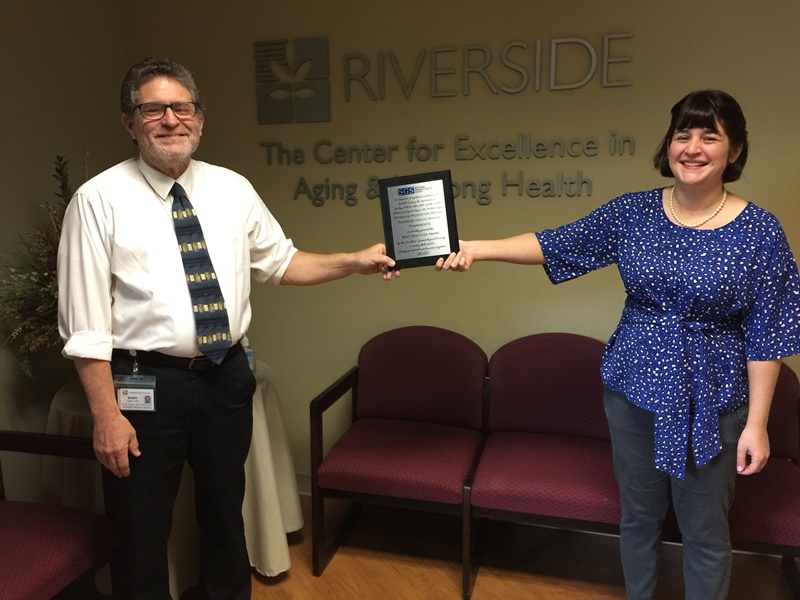
Patients and caregivers dealing with dementia have a tough road to navigate as they begin their journey to living with a disease that has no cure. Part of that journey, clinicians have reported time and time again, is managing, understanding and navigating what can be a complex medication regimen created to help improve quality of life and slow disease progression.
But monitoring and closely assessing the impact of those medications is a critical component of managing the disease, too.
Riverside was recently awarded a Southern Gerontological Society Best Practices Award for its work in Dementia Medication Reviews and the impact the program has had on people living with dementia and their caregivers.
The Best Practices Award from the Southern Gerontological Society recognizes programs, organizations, or aging services that engage in innovative and collaborative approaches intended to improve services and the quality of life for older adults. Awardees demonstrate evidence of significant contribution to the field of aging and the development of gerontology in the South.
The Riverside Dementia Medication Review program launched as part of a $1 million federal grant that the health system earned in 2018, led by the Riverside Center for Excellence in Aging and Lifelong Health.
With funding from the grant, Riverside created and expanded several programs that benefit older adults with dementia, including the Dementia Medication Review program, assessing more older adults for the disease, providing additional access to care consultation and physical wellness programs to help patients and their caregivers, expanding Memory Café to a new site, and launching additional training for family and professional caregivers who provide the majority of support for patients as their disease progresses.
The Dementia Medication Review program specifically integrated clinical pharmacists in the Geriatric Assessment Clinic and Memory Care Clinic with a goal to enhance the quantity and quality of medication reviews for patients.
This process of reviewing medications for patients – led by clinical pharmacists Jennifer Purdy and Barry Rumble – aimed to minimize risks and complications caused by using multiple medications to treat dementia as well as other serious and complex medical conditions. The pharmacists also carefully reviewed over-the-counter and herbal supplements that patients often have as part of their medication regimen.
“What is particularly exciting about the Riverside Medication Review program is that it deploys pharmacists as part of the interprofessional team to improve medication use in the outpatient clinic setting to impact a particularly vulnerable population,” wrote Patricia W. Slattum, PharmD, PhD, in her nomination letter for the award. Slattum serves as Professor Emeritus of Pharmacotherapy and Outcomes Science, VCU School of Pharmacy; Co-Principal Investigator, Geriatric Workforce Enhancement Program, Virginia Center on Aging; and as an Advisory Committee member for the grant Riverside received.
Medication reviews and assistance with medication selection in the Dementia Medication Review program are focused on monitoring for potential problems and medication interactions. Careful attention is given to over-the-counter products, patient adherence to medications, timing of medications, and asking the individual, families, and caregivers what are their goals for their medication management.
Optimizing as well as deescalating medication therapy is also stressed by the clinical pharmacists.
“In the first 100 medication reviews performed by the pharmacists for older persons in the two clinics serving residents of Williamsburg, Newport News and surrounding areas, 99 clients were identified as experiencing polypharmacy (the simultaneous use of multiple drugs to treat a single ailment or condition) and 82 were taking potentially inappropriate medications,” Slattum wrote. “The average number of prescribed medications was 13 and on average two prescribed medications were recommended for discontinuation.”
Learn more about Riverside’s Center for Excellence in Aging and Lifelong Health and its programs to support patients and caregivers with dementia at riversideonline.com/cealh.
Published: July 20, 2020
